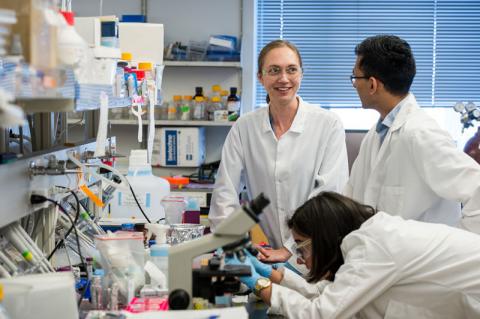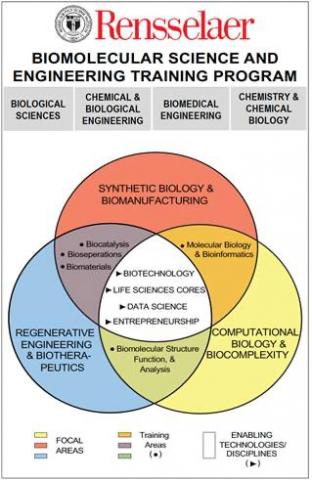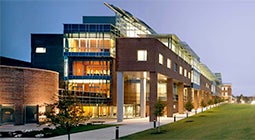The broad field of biomolecular science and engineering has dramatically advanced in recent years to accommodate increased interactions of engineers and life scientists, resulting in rapid growth of synthetic biology, biomanufacturing, stem cell biotechnology and data-driven therapeutics discovery, among other advances.

The Biomolecular Science and Engineering Training Program at Rensselaer (T32GM141865) is dedicated to the education of a broad and diverse pool of predoctoral students at the interface of biology, chemistry and engineering, focusing on the quantitative linkages that define this interface and prepare trainees for careers in biotechnology. The Program’s overarching objective is to provide the trainees with a keen understanding of the interdisciplinary nature of research, how it depends on fundamental underpinnings in both science and engineering, how it leads to innovative new scientific advances and technologies, and how basic science and engineering research can lead to new discoveries and commercial products that benefit society. The Training Program has been designed with key Program objectives to provide each trainee with a strong foundation in rigorous experimental design emphasizing rigor and reproducibility: to conduct ethical, responsible and productive predoctoral research with integrity and appropriate time-to-degree; to communicate and work effectively in teams with a diverse and broad pool of colleagues with multicultural sophistication; and to gain broad knowledge, professional skills and experiences for diverse careers in biomedical research.

The NIGMS Biomolecular Science and Engineering Training Program at Rensselaer focuses on 3 biotechnology research areas:
- Synthetic Biology & Biomanufacturing
- Computational Biology & Bioinformatics
- Regenerative Engineering & Biotherapeutics
These research thrusts lead to various combinations of 5 training areas:
- Biomolecular Structure, Function & Analysis
- Biomaterials
- Bioseparations
- Biocatalysis
- Molecular Biology & Bioinformatics
Goals:
To provide trainees with:
- A keen understanding of the interdisciplinary nature of research
- How it depends on fundamental underpinnings in both science and engineering
- How it leads to innovative new scientific disciplines and technologies
- Knowledge of commercial product development and start-up evolution
- Skills for career exploration and professional advancement
Key Features:
- Joint supervision and multidisciplinary Ph.D. thesis committee
- Industrial internship (2-3 months)
- Mandatory Courses:
- Ethical Considerations in Biotechnology
- Perspectives in Biomolecular Science and Engineering
- Courses in 4 core areas of biomolecular science and engineering
- Training in entrepreneurship and commercial translation
- Training in professional development
- Training enrichment in human health, physiology, and disease through symposia with clinical and industry partners
- Frontiers in Biotechnology: Seminar Series
- Frontiers in Biotechnology: Industrial Lecture Series
National Institutes of Health (NIH)
NIH is made up of 27 Institutes and Centers, each with a specific research agenda, often focusing on particular diseases or body systems.
National Institute of General Medical Sciences (NIGMS)
NIGMS supports basic research that increases our understanding of biological processes and lays the foundation for advances in disease diagnosis, treatment, and prevention. NIGMS-funded scientists investigate how living systems work at a range of levels from molecules and cells to tissues and organs, in research organisms, humans, and populations. Additionally, to ensure the vitality and continued productivity of the research enterprise, NIGMS provides leadership in training the next generation of scientists, in enhancing the diversity of the scientific workforce, and in developing research capacity throughout the country.
National Institute of General Medical Sciences (NIGMS) Sandbox
The NIGMS Sandbox, a cloud-based learning platform provides access to data science learning modules that teaches students, researchers, and clinicians, how to utilize the power of cloud technology for the benefit of life sciences applications and research.
Contact:
Dr. Deepak Vashishth, Director, (T32; NIGMS) Training Program
Biomolecular Science and Engineering
Shirley Ann Jackson, Ph.D. Center for Biotechnology and Interdisciplinary Studies
Rensselaer Polytechnic Institute
110 8th Street, BT 2213
Troy, NY 12180-3590
vashid@rpi.edu
(518) 276-2296
NIH Training Programs at RPI on LinkedIn
